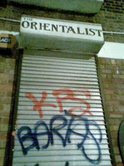Heads of state are not normally informed by the avant garde. When charged with the task of maintaining whatever seemingly exists, the oppositional bent of subversive art is not quite conducive to survival. Creativity in politics can only ultimately lead to one of two dire endpoints – trace your line too far right and you’re left atop Ichigaya Camp imploring the masses to loosen their Runaway Horses into the beautiful void of ritual suicide, trace your line too far left, a la Mao, and the enemy of your murdered friend becomes your murdered friend.
So why with all this historical knowledge at his disposal, does President Obama insist on employing the language of America’s last musical avant garde?
Most people hate the 80s. Like the Dude’s distaste for the ‘fucking Eagles,’ the 80s represent the destruction of all that was made sacred before; the inordinate amount of possibilities that the 60s seemingly opened up. With post-modernist conservatives manning the helms of the not-so free world, seeking ‘peace through strength’ and art and music becoming an empty shell of signification and commodification, many read only hopelessness in that dreaded decade. Yet out of the figurative and literal apocalypse of dialectical suburban and urban life, came forth something briefly hopeful. Narrators Greil Marcus, Michael Azerrad and Jeff Chang tell the best tall tales of this period.
The world had been laid to waste. The division of labour and the division of any vestige of community had manufactured a hopeless individualism. In an inverse of the narratives of the oppressive GDR, the residents of the free world had no future. Freedom wasn’t free. And what was worse, there was Nothing to do. And nothing anyone could do. Of course, where there’s youth, there’s profligacy. Seeking an end to their impotence, the youth decided to move. Do it Yourself! was the imperative. With boundless energy, discipline and hard work, young people ‘became what they were’ constructing transcontinental communities around the do-it-yourself art and tenets of ‘we, togetherness.’ (The Century) Kevin Seconds said it best,
We Live In Constant War
Destroy All That Tradition
And Live Before You Die
Lets Rock Together From Now On
And Never Be Denied
It was all very Nietzsche.
But like every moment of becoming, the event was crushed like a Hungarian spring. MTV and Margaret Thatcher were perfect symbols of the structural impediments of reactionary government and capital. The wall tumbled down.
On the African continent, this same DIY ethic sent ruptures through the oppressive sameness of colonialism. Woodrow Wilson called it self-determination. But do it yourself was the imperative. Some scholars tended to see the movements as copycat nationalism, enveloped in a childish jealousy for sameness. Despite choosing to make themselves within the boundaries of the colonial state, there seemed to be a vast diversity of creativity. Of course, destroying ‘all that tradition’ was not without it’s share of Sartrean violence. It was all very hard work. Though something went terribly wrong. Counterrevolution and Structural Adjustment embodied the same closure as MTV and Margaret Thatcher. RENAMO was the symbol of this return.
Yet there our gentle President stood on a fine summer’s day in Accra urging Africans to Do it Yourself! “We must start from the simple premise that Africa’s future is up to Africans.”
“For just as it is important to emerge from the control of another nation, it is even more important to build one’s own.”
Moving calmly and sympathetically over the history of the continent, the next words signaled a subtle shift in meaning.
“This progress may lack the drama of the 20th century’s liberation struggles, but make no mistake: it will ultimately be more significant.”
It seemed his DIY was very different.
The Hegelian twin of our DIY was the mantra of enormo-home improvement corporation, Home Depot. Housing endless building supplies, bored consumers could channel their creativity, empowering themselves, within established bounds. This was grown-up DIY. Obama’s DIY.
And so for the duration of his speech he sat Africa on his fatherly knee, employing the rhetoric of good governance and entrepreneurship, urging Africa to temper its past creativity and move forward with his plan. Like Home Depot, liberal democracy is the state ordained method of political creativity. It is all there. You have no one to blame but yourself.
Do it yourself is also a great source of freedom. Africans are still subject to the tyrannical outcomes of their previous childish choices. “No country is going to invest in a place where the government skims 20 percent off the top…that is not democracy, that is tyranny, and now it is time to end.”
Shifting again, Obama continued,
“The people of Africa are ready to claim that future. In my country, African-Americans – including so many recent immigrants – have thrived in every sector of society. We have done so despite our difficult past”
“Freedom is your inheritance. Now, it is your responsibility to build upon freedom’s foundation.”
Feeling creative? Visit Home Depot.
Start to the year! 365 days of green!
10 years ago

